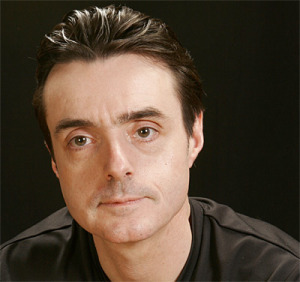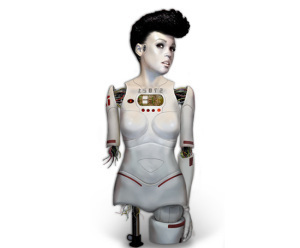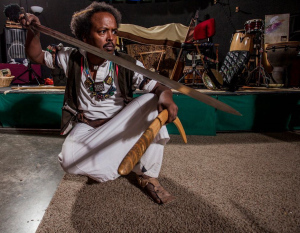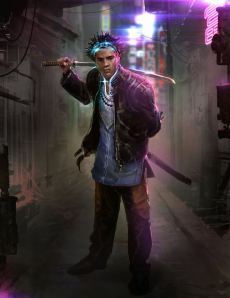WHAT’S IN A NAME? Afrofuturism vs. Black Speculative Fiction!
Recently, in the popular Facebook group – State of Black Science Fiction 2012 (2012 is the year the collective of authors, artists, musicians, game creators, filmmakers and fans formed) – I asked the following question:
“Why is there no clear cut definition of ‘Afrofuturism’? Is it because the term was not coined by a person of African descent, thus the examination comes from an external lens? Just wondering. Thoughts?”
I received several responses. Here are a few:

Mark Dery, father of Afrofuturism…yep.
Ronald Jones: Afrofuturism wasn’t coined by a black person? :-o
Balogun Ojetade: Nope, it was coined by Mark Dery, Ronald.
Balogun Ojetade: This is why self-defining terms like Sword and Soul, Steamfunk, Dieselfunk, Rococoa and Urban (capital “U”) Fantasy are so important.
Ronald Jones: Now that is interesting! It just shows, we not only have to participate in all areas of speculative fiction, we have to claim them! Make them ours!
Balogun Ojetade: Even Black Speculative Fiction works, even though “Speculative Fiction” was coined by Robert Heinlein – a posterboy for racism – in 1941 (or so it has been said), because WE added “Black.” No one added it FOR us.
Ronald Jones: That’s right! It’s like jumping into a public pool and daring the other swimmers to say something crazy!
Pharoah Ama Khoe: We gotta stop letting other people define our culture.
Science-Is Fiction: The term is indeed problematic for that reason, but I think for the time being, it’s a good common term for people to build community around it and feels intuitive as a definition for some of the work that people are producing.
I think the origins of many terms that we use to define or identify are problematic. Even the word Africa is of suspect origin.
I think Afrofuturism has so many different definitions because people have developed it and practice and utilize it differently, and I can see the beauty in that. I think generally, people have the same idea when they hear “Afrofuturism,” but there are also particular nuances to it, just like there is to any genre.
Valjeanne Jeffers: I totally agree. I had to explain the term to a sister at the Spelman Octavia Arts and Activism event. The way I explained Afrofuturism was think hard SF…now, think of Black hard SF and/or any future imagined by someone of African descent.
I’d like to expand this to include ALL people of color.
Trina Lala: I remember we talked about this term b4…OR I looked it up after seeing it on here…the definition was elusive. I think that Science-Is-Fiction helped me understand better with her page…but then, like Valjeanne Jeffers mentioned, I had someone describe themselves as such completely out of the context of Sci-Fi…but referencing being of an African mindset with thoughts of our future……I was a bit perplexed but figured she was literally correct…LOL
I love coining my own terms and understand the power of a name as well as the ability to name oneself…it is ULTIMATELY important when one considers the energy that this holds…I coined the term Agro-Africanist for myself and others who deal with or study agriculture thru an African lens. I feel that even if one vibes with a label or term that someone outside of their culture coined, they always have the power to create another term themselves that still holds true to their understanding of that definition…WHY NOT!?
If I choose to stop identifying with the word African because it was not of our culture’s making, I would have no problem with that. It is MY choice. That is the freedom we possess, if we want it.
Milton Davis: I’m not a big fan of the term because I’m not clear on what it represents. When I hear Afrofuturism, I think science fiction that incorporates the social issues of Black people. I kind of have a problem with that, because I’m not interested in reading science fiction that imagines us dealing with the same issues 10,000, 1,000, 100 or even 10 years from now. Plus while I’ve seen music and artwork labeled Afrofuturism, I’ve come across very little literature identified clearly as such.
Science-Is Fiction, do you consider your recent book Afrofuturism? (I plan on reading it, by the way. It looks very intriguing)
Science-Is Fiction: Milton Davis thank you! I look forward to your thoughts on it.
Good question. I think my novel comfortably fits under Black Sci-Fi, experimental fiction, slip stream, or Afrofuturistic.
I appreciate your thought about not wanting to see us dealing with these same issues in SciFi so far into the future. But I think I see the future as relative, which is why Afrofuturism appeals to me. It empowers me to think of the future as being now…or the next moment…or tomorrow. It empowers me to think of time differently, much in the way that I am told my ancestors in African communities experienced time, as cyclical and non-linear. It invokes for me the thought of Octavia Butler’s time machine in Kindred, and how the concept of the future became relative to Dana when she had to ensure her bloodline.
Afrofuturism allows me to use Sci-Fi to explore things that I have experienced or people I work with experience everyday (incarceration, teen pregnancy, interactions with the foster care system), where these institutions and issues are present and accounted for in their foreseeable future.
The people in my immediate social circle and community are not so much looking 1000 years into the future because they are really unable to conceptualize even making it to the next week. So, while I don’t think Mark Dery had any of these concepts in mind when he coined the term, I think the term and how people apply it has evolved in a healthy way. And not everyone will identify with it or has to, and like with any community, there will be disagreement on language simultaneous to agreements and commonalities that allow us to recognize all of us Black Sci-Fi-entists / Spec Fictionists / Afrofuturists as having some common goals of self-expression and actively engaging our identities and the communities we come from.
But, at the same time, I agree with others and these are things that I actively renegotiate all the time as I participate in Afrofuturism.
Alan Jones: Not real worried about who coined the term. Even the words (European) and letters (Indian/South Asian) we use to discuss this are not ours; no more so than the universal language, (born in Africa) of mathematics and science belongs to them. We are all authors in this play called “Man” (or “Woman”).
Eric Wilkerson: From how I see the term used I believe it means “If you are not Black, you will not be included in our depictions of the future and its arts since you don’t include us in your mainstream vision of Sci-Fi / Fantasy.”
The word is exclusionary, which makes the art form no better than the segregation and omission of diversity in typical American Sci-Fi / Fantasy art. I’m less concerned about making totally Afrocentric art and more with doing something multicultural. Let everyone know they can and should be represented. “Multicultural Futurism” perhaps.
Just my opinion, so I hope nobody flips out.
Milton Davis: I don’t see the word as exclusionary.
While I don’t think there is a clear definition, what it does guarantee to me is that whatever the story is, it will include people of African descent in it, which we all have to admit has been, and still is, seriously lacking.
An Afrofuturism or Black Speculative Fiction story might contain all Black characters or it might contain main Black characters in a multi-cultural setting. This is a direct reflection of my life. There are times I’m in a multicultural situation, and there are times that I’m in an all black environment.
Afrofuturism, Sword and Soul, Steamfunk, Urban Fantasy and Roccoa insure our inclusion as a whole in the genres they are associated with, even though the individual project might be exclusive.
Balogun Ojetade: Thank you, Milton!
I think we are mature enough creators to write without a tit-for-tat reaction to what white writers have historically done to us in speculative fiction. The concern is with seeing ourselves in fiction as the main characters; with telling OUR stories. If what we are doing is purposeful exclusion as payback, or if we create with the idea of alienating or NOT alienating others, then others are actually in control of our work. Thankfully, such is not the case with MOST of us.
 For those unfamiliar with ‘Afrofuturism’, it is a term coined by Caucasian cultural critic Mark Dery in 1993 to describe the particular strain of science fiction concerned with black experiences.
For those unfamiliar with ‘Afrofuturism’, it is a term coined by Caucasian cultural critic Mark Dery in 1993 to describe the particular strain of science fiction concerned with black experiences.
Dery claims that “Speculative fiction that treats African-American themes and addresses African-American concerns in the context of 20th century technoculture — and, more generally, African-American signification that appropriates images of technology and a prosthetically enhanced future — might, for want of a better term, be called Afrofuturism.”
By Dery’s definition, Afrofuturism would only apply to a specific type of Black Speculative art: “Speculative fiction that treats African-American themes and addresses African-American concerns…”
So, Afrofuturism does not seem to be concerned with continental African themes or Speculative Fiction from anywhere in the Diaspora other than the United States.
And yes, I know, the Americas include the continent of South America and the country of Canada, but people of African descent from South America or Canada are not referred to as “African-American.”
 Afrofuturism also does not seem to be concerned with the past – the usual settings of Steamfunk, Sword and Soul and Rococoa – as it is defined as “Speculative fiction that treats African-American themes and addresses African-American concerns in the context of 20th century technoculture…” Perhaps Dieselfunk meets the requirements of Afrofuturism by this definition, but it is doubtful, as Dery goes on to say “…and, more generally, [Afrofuturism is]African-American signification that appropriates images of technology and a prosthetically enhanced future…”
Afrofuturism also does not seem to be concerned with the past – the usual settings of Steamfunk, Sword and Soul and Rococoa – as it is defined as “Speculative fiction that treats African-American themes and addresses African-American concerns in the context of 20th century technoculture…” Perhaps Dieselfunk meets the requirements of Afrofuturism by this definition, but it is doubtful, as Dery goes on to say “…and, more generally, [Afrofuturism is]African-American signification that appropriates images of technology and a prosthetically enhanced future…”
By this definition, Afrofuturism would, of course, be an appropriate term for Cyberfunk and perhaps other futuristic Black / African Science Fiction and maybe some Fantasy set in the future, like the novel Redeemer, which deals with a man forced to return to his past and turning that misfortune into an opportunity to save the life of his father, thus saving his teen self from a life of crime.
Dery created the term Afrofuturism to explore how Black people negotiate life in a technology intensive world. Interestingly, all those contemporary authors whom Dery dared to identify as Afrofuturist – Samuel R. Delany; Octavia Butler; and Nalo Hopkinson – explicitly identify themselves as Science Fiction authors. I believe that his lumping of these authors – who all write very different works – under his umbrella term, not a term coined by the creators, was the typical, ill-informed, white privileged way of making Black people monolithic.
So, what are your thoughts?
Should the creators of Black Speculative fiction, film and art define all such works as Afrofuturism? As Black Speculative Fiction? As some other term, or as nothing at all?






